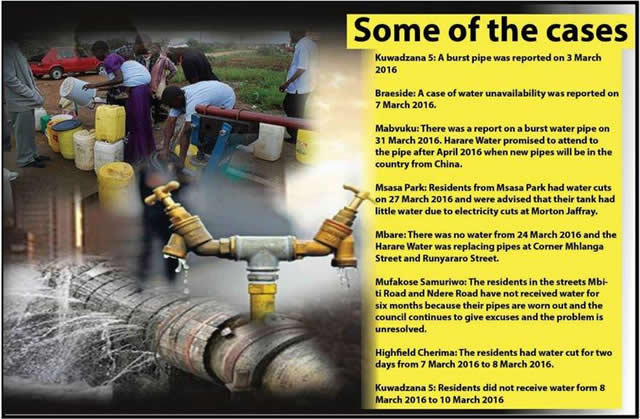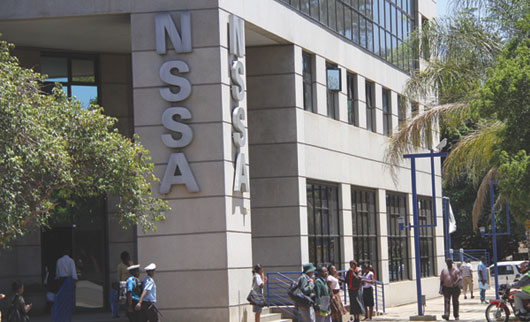Water woes dog Harare residents

Sydney Kawadza : Senior Features Writer
Day in day out, Zimbabwe urban citizens have a common challenge of water shortages. Residents in areas like Mabvuku, Tafara, Greendale, Hatcliffe, among others, have given up any hope of ever seeing water coming out of their taps. Only last month, the world celebrated World Water Day. Each year, World Water Day highlights a specific aspect of freshwater. Under the theme “Water and Jobs”, the year 2016 provides an important opportunity to consolidate and build upon the previous World Water Days to highlight the two-way relationship between water and the decent work agenda in the quest for sustainable development.
World Water Day dates back to the 1992 United Nations (UN) Conference on Environment and Development where international observance for water was recommended.
In response, the UN General Assembly declared March 22, 1993 as the first World Water Day.
It has been held annually since then.
However, Zimbabweans in urban areas had little reason to celebrate.
Some were queuing for the precious liquid.
It is all frustrating.
“For years we have had to endure the early morning ritual of queuing for hours at this borehole to get water for domestic use,” Mrs Mary Munawa of Hatcliffe said.
Every morning she joins hundreds other women who queue for water at the borehole.
A few kilometres further authorities at SIRDC headquarters use a hosepipe to share their water with adjacent houses.
Some residents have however sunk their own boreholes.
“Only a few can afford to sink the boreholes but no-one knows how safe they are or if they are legal according to council by laws and regulations,” Tinashe Macheka said.
The queues are a common feature in Harare as the city fathers seem to have no clue on what to do.
The water has also been deemed unsafe for human consumption due to severe pollution of the city’s main water sources, especially Lake Chivero.
In Harare, there are suburbs that have not seen water coming out of their taps for years.
One joke has it that some children were born and even started school without seeing water running from their taps.
That is clearly synonymous with Mabvuku, Tafara, Ruwa and other eastern suburbs of Harare.
This is in contrast to the Zimbabwean Constitution, which outlines the need to uphold human rights.
Access to water is a right in terms of the Zimbabwean Constitution, Chapter 4, Section 77 (a), under the Right to Food and Water, which stipulates that every person has the right to safe, clean and potable water.
It further states that the State must take reasonable legislative and other measures, within limits of the resources available to it, to achieve the progressive realisation of this right.
The law is derived from Articles 11 and 12 of the International Covenant on Economic, Social and Cultural Rights.
Every person has a right to have at 20 litres of water a day.
The demand is consistent with the UN General Assembly Resolution in recognition of access to clean water sanitation as a human right delivered in 2010 at the 64th UN General Assembly.
The Convention on Elimination of Discrimination Against Women and the UN Human Rights Council resolution 12 /8 recognise water as a human right.
The ICESCR General Comment No. 15 on the right to water says it is a limited natural resource and a public good fundamental for life and health.
The human right to water is indispensable for leading a life in human dignity and it is a prerequisite for the realisation of other human rights.
The covenant further states that the right to water entitles everyone to sufficient, safe, acceptable, physically accessible and affordable water for personal and domestic uses.
“An adequate amount of safe water is necessary to prevent death from dehydration, to reduce the risk of water-related disease and to provide for consumption, cooking, personal and domestic hygienic requirements,” it further states.
Water issues are critical for the residents who should be worried about the abuse of their rights by authorities.
Even clamour from pressure groups like the Harare Residents Trust, Combined Harare Residents Association and the Chitungwiza Residents Association have not yielded any results.
According to the Harare Residents Trust, Harare City Council is supplying about 55 percent of water to residents leaving the rest to find alternative ways of accessing water contrary to the Zimbabwean Constitution which provides for the progressive realisation of the right to water.
The HRT further asserts that water accessibility, availability, acceptance and water quality (AAAQ) are a cause of concern to residents in Harare.
The HRT cites the Danish Institute for Human Rights which explains the AAAQ framework.
Availability identifies whether there is a sufficient amount of water available within a given geographical area.
Accessibility is concerned with the level of access and identifies who has access to the water sources.
The framework further identifies non-discrimination as a specific element of accessibility as well as an overarching human rights principle for all AAAQ criteria.
Information accessibility is concerned with the accessibility of information on water related issues including provision of information about how and when rights holders can participate in policy and decision-making processes.
The framework includes acceptability concerned with subjective assessments of the rights holders’ perceptions about water and the delivery of water.
Consumer acceptability includes the characteristics of the water, such as odour, taste and colour, as well as procedural considerations, such as, the behaviour of water suppliers.
Quality, which is the quality of water in objective, scientific terms and it is closely tied to international quality standards.
It also notes that assessing the quality of water is highly complex and requires technical expertise on micro-organisms and chemicals that might pose a health risk.
According to the HRT director Mr Precious Shumba: “When measuring water quality, efforts should be made to either make use of quality assessments from WHO and UNICEF or engage technical expertise on water quality.”
He said water is a human right to be enjoyed by every citizen irrespective of economic and social status.
“The quality of water should meet the basic standards set by the World Health Organisation (WHO) and should be visibly clean to inspire confidence in the consumers.”
He said the City of Harare should drastically cut down on the leakages along the water distribution network.
The city fathers have reported that 60 percent is being lost through illegal water connections, leakages, thefts.
Council has revealed that 60 percent of Harare water is non-revenue water while 30 percent is being used but not being paid for.
A further 30 percent, according to council, is lost due to illegal connections, faulty metering, leakages due to an aging water supply network and general water thefts.
“The City of Harare is not investigating why there is collaborative theft of council water revenue by irresponsible residents and council employees,” Shumba said.
“The Harare City Council does not have a plan to address the problem of non-revenue water as identified in the 2014 and 2015 budget statements, and strategic planning documents.”
He urged council to put more resources on the replacement of underground pipes and curbing thefts and illegal connections.
“Water thefts and illegal connections have to be plugged and the monitoring of the distribution network should be strengthened to increase accountability and transparency in the utilisation of water resources.
“The fact that the City of Harare is not giving this area much thought and consideration shows that the officials in the council are somehow benefiting from this unclear situation hence pushing for prepaid water meters.”
Shumba, however, urged residents to pay what they can afford.
He said the local authorities and Government should be responsive to this issue and take it as the most pressing social need from the citizens.
Council, Shumba added, has to address issues of replacement of underground pipes, even distribution of water and supply of clean, safe and potable water.
It is however, critical for residents to realize their right to water and take the challenge to the authorities.
Feedback: [email protected]










Comments